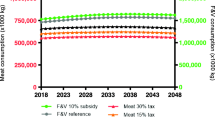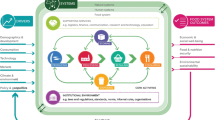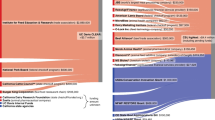Abstract
The contribution of livestock production to climate change is now widely acknowledged. Despite this, efforts to reduce meat consumption in light of climate change have been relatively limited. One potential avenue for encouraging consumption changes is via non-governmental organizations (NGOs). This study used a qualitative approach to understand how and to what extent environmental, food-focused, and animal protection NGOs in the U.S., Canada, and Sweden have worked to reduce or alter domestic meat consumption in light of climate change. While almost all of the NGOs examined had mentioned the issue on their websites, few had established formal campaigns to reduce meat consumption. Active public outreach was dominated by animal protection and food-focused groups, particularly in the U.S. and Canada. Animal protection organizations advocated for larger reductions in meat consumption than environmental groups. Few NGOs sought to promote national-level polices to reduce meat consumption. There is a continued need for public education campaigns with clear messages, particularly by environmental NGOs, as well as efforts to build support for policy measures that seek to reduce meat consumption.
Similar content being viewed by others
Notes
Animal protection NGOs includes both animal welfare and animal rights focused NGOs.
FAO per capita meat supply is used as a proxy for consumption.
References
Berners-Lee M, Hoolohan C, Cammack H, Hewitt CN (2012) The relative greenhouse gas impacts of realistic dietary choices. Energy Policy 43:184–190
Bristow E, Fitzgerald A (2011) Global climate change and the industrial animal agriculture link: the construction of risk. Soc Anim 19(3):205–224
Capper JL (2012) Is the grass always greener? Comparing the environmental impact of conventional, natural and grass-fed beef production systems. Animals 2(2):127–143. doi:10.3390/ani2020127
Carlsson-Kanyama A, González AD (2009) Potential contributions of food consumption patterns to climate change. Am J Clin Nutr 89(5):1704S–1709S
Charmaz K (2006) Constructing grounded theory. A practical guide through qualitative analysis. Sage Publications Ltd, London
Cox R (2013) Advocacy Campaigns and message construction. In: Environmental Communication and the Public Sphere, 3rd edn. Sage Publications, Thousand Oaks, pp 209–244
de Boer J, Schösler H, Boersema JJ (2013) Climate change and meat eating: an inconvenient couple? J Environ Psychol 33:1–8
Doyle J (2011) Sustainable consumption?: Reframing meat and dairy consumption in the politics of climate change. In: Mediating climate change. Ashgate Publishing, Burlington, pp 123–144
FAO (2009) The State of Food and Agriculture, Livestock in the Balance, Food and Agriculture Organization of the United Nations, Rome. http://www.fao.org/docrep/012/i0680e/i0680e.pdf. Accessed August 3, 2012
FAO (2012) FAOSTAT database collections, Food and Agriculture Organization of the United Nations, Rome. http://faostat.fao.org/. Accessed August 3, 2012
Freeman CP (2010) Meat's place on the campaign menu: how US environmental discourse negotiates vegetarianism. Environ Commun 4(3):255–276
Gais T, Walker JL Jr (1991) Pathways to influence in American politics. In: Walker JL Jr (ed) Mobilizing interest groups in America. University of Michigan, Ann Arbor, pp 103–121
Garnett T (2012) Climate change and agriculture: Can market governance mechanisms reduce emissions from the food system fairly and effectively? International Institute for Environment and Development. http://pubs.iied.org/pdfs/16512IIED.pdf? Accessed September 7, 2012
González AD, Frostell B, Carlsson-Kanyama A (2011) Protein efficiency per unit energy and per unit greenhouse gas emissions: potential contribution of diet choices to climate change mitigation. J of Food Policy 36(5):562–570. doi:10.1016/j.foodpol.2011.07.003
Harris JE, Gleason PM, Sheean PM, Boushey C, Beto JA, Bruemmer B (2009) An introduction to qualitative research for food and nutrition professionals. J Am Diet Assoc 109(1):80–90. doi:10.1016/j.jada.2008.10.018
Humane Research Council (2007) Advocating Meat Reduction and Vegetarianism to Adults in the U.S. http://www.humanespot.org/content/advocating-meat-reduction-and-vegetarianism-us-adults. Accessed February 14, 2013
Kollmuss A, Agyeman J (2002) Mind the gap: why do people act environmentally and what are the barriers to pro-environmental behavior? Env Educ Res 8(3):239–260
Lea E, Worsley A (2008) Australian consumers’ food-related environmental beliefs and behaviours. Appetite 50:207–214. doi:10.1016/j.appet.2005.07.012
MacMillan Y, Durrant R (2009) Livestock consumption and climate change. WWF-UK. http://assets.wwf.org.uk/downloads/fec_report_.pdf. Accessed September 7, 2012
Maxwell JA (2010) Using numbers in qualitative research. Qual Inq 16(6):475–482
McMichael A, John J, Powles W, Butler CD, Uauy R (2007) Food, livestock production, energy, climate change, and health. Lancet 370(9594):1253–1263
Naturvårdsverket (2011) Köttkonsumtionens Klimatpåverkan: Drivkrafter Och Styrmedel. http://www.naturvardsverket.se/Documents/publikationer6400/978-91-620-6456-3.pdf Accessed September 7, 2012
Neff R, Iris A, Chan L, Clegg Smith K (2009) Yesterday’s dinner, tomorrow’s weather, today’s news? US newspaper coverage of food system contributions to climate change. Public Health Nutr 12(7):1006–1014. doi:10.1017/S1368980008003480
Nordgren A (2012) A climate tax on meat? In: Potthast T, Meisch S (eds) Climate change and sustainable development, 1st edn. Wageningen Academic Publishers, Wageningen, pp 109–115
Ockwell D, Whitmarsh L, O'Neill S (2009) Reorienting climate change communication for effective mitigation: forcing people to be green or fostering grass-roots engagement? Sci Commun 30(3):305–327
Pelletier N, Pirog R, Rasmussen R (2010) Comparative life cycle environmental impacts of three beef production strategies in the Upper Midwestern United States. Agric Syst 103(6):380–389. doi:10.1080/17524032.2010.501998
Peters GM, Rowley HV, Wiedemann S et al (2010) Red meat production in Australia: life cycle assessment and comparison with overseas studies. Environ Sci Technol 44(4):1327–1332. doi:10.1021/es901131e
Pew Charitable Trusts and Johns Hopkins Bloomberg School of Public Health (2008) Putting Meat on the Table: Industrial Farm Animal Production in America: a Report of the Pew Commission on Industrial Farm Animal Production. http://www.ncifap.org/_images/PCIFAPFin.pdf. Accessed August 3, 2012
Popp A, Lotze-Campen H, Bodirsky B (2010) Food consumption, diet shifts and associated Non-CO2 greenhouse gases from agricultural production. Glob Environ Chang 20(3):451–462
Powell TWR, Lenton TM (2012) Future carbon dioxide removal via biomass energy constrained by agricultural efficiency and dietary trends. Energy Environ Sci. doi:10.1039/c2ee21592f
Saxe H, Larsen TM, Mogensen L (2012) The global warming potential of two healthy nordic diets compared with the average danish diet. Clim Chang. doi:10.1007/s10584-012-0495-4
Scarborough P, Allender S, Clarke D (2012) Modelling the health impact of environmentally sustainable dietary scenarios in the UK. Eur J Clin Nutr 66:710–715. doi:10.1038/ejcn.2012.34
Schösler H, de Boer J, Boersema JJ (2012) Can we cut out the meat of the dish? constructing consumer-oriented pathways towards meat substitution. Appetite 58(1):39–47. doi:10.1016/j.appet.2011.09.009
Singh HR, Rahman SA (2012) An approach for environmental education by non-governmental organizations (NGOs) in biodiversity conservation. Procedia Soc Behav Sci 42:144–152
Stehfest E, Bouwman L, Vuuren DP et al (2009) Climate benefits of changing diet. Clim Chang 95(1–2):83–102. doi:10.1007/s10584-008-9534-6
Steinfeld H, Gerber P, Wassenaar TD et al (2006) Livestock's long shadow: environmental issues and options. Food and Agriculture Organization of the United. Nations, Rome
Thøgersen J, Crompton T (2009) Simple and painless? The limitations of spillover in environmental campaigning. J Consum Policy 32(2):141–163. doi:10.1007/s10603-009-9101-1
Tobler C, Visschers VHM, Siegrist M (2011) Eating green. Consumers' willingness to adopt ecological food consumption behaviors. Appetite 57(3):674–682. doi:10.1016/j.appet.2011.08.010
Weber CL, Matthews HS (2008) Food-miles and the relative climate impacts of food choices in the United States. Environ Sci Technol 42(10):3508–3513. doi:10.1021/es702969f
Weber EU (2006) Experience-based and description-based perceptions of long-term risk: why global Warming does not scare us (Yet). Clim Chang 77(1):103–120. doi:10.1007/s10584-006-9060-3
Wirsenius S, Hedenus F, Mohlin K (2010) Greenhouse gas taxes on animal food products: rationale, tax scheme and climate mitigation effects. Clim Chang 108(1–2):159–184. doi:10.1007/s10584-010-9971-x
Acknowledgments
This work was supported by the Johns Hopkins Center for a Livable Future, the Johns Hopkins University Environment, Energy, Sustainability, & Health Institute, the Culture and Animals Foundation, and the Lipitz Public Health Policy Fund located in the Johns Hopkins Bloomberg School of Public Health Office of Public Health Practice and Training. Thanks go to the study participants and to Katherine Clegg-Smith and Adam Sheingate for valuable feedback.
Author information
Authors and Affiliations
Corresponding author
Additional information
This research was conducted while Linnea Laestadius was a PhD Candidate at the Johns Hopkins Bloomberg School of Public Health. Dr. Laestadius is now at the Joseph J. Zilber School of Public Health, University of Wisconsin-Milwaukee.
Rights and permissions
About this article
Cite this article
Laestadius, L.I., Neff, R.A., Barry, C.L. et al. Meat consumption and climate change: the role of non-governmental organizations. Climatic Change 120, 25–38 (2013). https://doi.org/10.1007/s10584-013-0807-3
Received:
Accepted:
Published:
Issue Date:
DOI: https://doi.org/10.1007/s10584-013-0807-3




